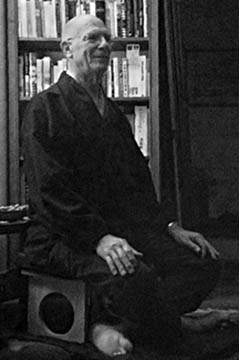Dear All,
Please join our SPECIAL MEMORIAL ZAZENKAI, led by our Yugen from Maine, in honor of someone who was his friend and mentor of many years, Rev. Zenshin "Tim" Buckley of the Great River Zendo, who left our visible world during the Spring. Rev. Buckley was a guide to Yugen and a friend of this Sangha.

More about the life and character of Rev. Buckley is below in this thread.
Please note that our Zazenkai will begin at the usual time, but may run 10 or 20 minutes longer than usual. The ZAZENKAI netcast will commence from Maine/New York 9pm, Los Angeles 6pm (Friday night), London 2am and Paris 3am (early Saturday morning). For those who cannot attend at that time, the Zazenkai is available to sit any time thereafter, and you are invited to join and sit with Yugen and all of us. The screen and link is here:
To mark Rev. Buckley's passing, Yugen shall chant today the SHARIRAIMON (Verse of Homage to Buddha's Relics) (in Japanese ... the words are below if you wish to follow along) ... Otherwise, we shall continue in our usual way with the Heart Sutra in English and according to the schedule below. Shariraimon is the Verse that Master Ejo is said to have recited for Master Dogen upon his passing.
OUR SITTING SCHEDULE IS AS FOLLOWS (AS MENTIONED, WE MAY RUN A LITTLE BIT LONGER):
00:00 – 00:20 CEREMONY (HEART SUTRA in English/SHARIRAIMON in Japanese) and Dedication.
00:20 – 00:45 ZAZEN
00:45 – 00:55 KINHIN
00:55 – 01:05 Words by Yugen about Tim
01:05 – 01:35 ZAZEN
01:35 – 01:40 FOUR VOWS, & VERSE OF ATONEMENT
Nine Bows, J
Please join our SPECIAL MEMORIAL ZAZENKAI, led by our Yugen from Maine, in honor of someone who was his friend and mentor of many years, Rev. Zenshin "Tim" Buckley of the Great River Zendo, who left our visible world during the Spring. Rev. Buckley was a guide to Yugen and a friend of this Sangha.
More about the life and character of Rev. Buckley is below in this thread.
Please note that our Zazenkai will begin at the usual time, but may run 10 or 20 minutes longer than usual. The ZAZENKAI netcast will commence from Maine/New York 9pm, Los Angeles 6pm (Friday night), London 2am and Paris 3am (early Saturday morning). For those who cannot attend at that time, the Zazenkai is available to sit any time thereafter, and you are invited to join and sit with Yugen and all of us. The screen and link is here:
To mark Rev. Buckley's passing, Yugen shall chant today the SHARIRAIMON (Verse of Homage to Buddha's Relics) (in Japanese ... the words are below if you wish to follow along) ... Otherwise, we shall continue in our usual way with the Heart Sutra in English and according to the schedule below. Shariraimon is the Verse that Master Ejo is said to have recited for Master Dogen upon his passing.
OUR SITTING SCHEDULE IS AS FOLLOWS (AS MENTIONED, WE MAY RUN A LITTLE BIT LONGER):
00:00 – 00:20 CEREMONY (HEART SUTRA in English/SHARIRAIMON in Japanese) and Dedication.
00:20 – 00:45 ZAZEN
00:45 – 00:55 KINHIN
00:55 – 01:05 Words by Yugen about Tim
01:05 – 01:35 ZAZEN
01:35 – 01:40 FOUR VOWS, & VERSE OF ATONEMENT
Verse of Homage to Buddha's Relics
舎利礼文 (Shariraimon)
一心頂禮
IS-SHIN CHŌ RAI
萬德圓滿
MAN DOKU EN MAN
釋迦如來
SHA KA NYO RAI
眞身舍利
SHIN JIN SHA RI
本地法身
HON JI HŌS-SHIN
法界塔婆
HŌ KAI TŌ BA
我等禮敬
GA TŌ RAI KYŌ
爲我現身
I GA GEN SHIN
入我我入
NYŪ GA GA NYŪ
佛加持故
BUTSU KA JI KO
我證菩提
GA SHŌ BO DAI
以佛神力
I BUTSU JIN RIKI
利益衆生
RI YAKU SHU JŌ
發菩提心
HOTSU BO DAI SHIN
修菩薩行
SHU BO SATSU GYŌ
同入圓寂
DŌ NYŪ EN JAKU
平等大智
BYŌ DŌ DAI CHI
今將頂禮
KON JŌ CHŌ RAI
* * *
WITH WHOLEHEARTED REVERENCE WE BOW TO THE RELICS OF THE TRUE BODY OF THE TATHAGATA SHAKYAMUNI, WHO IS FULLY ENDOWED WITH MYRIAD VIRTUES;
TO THE DHARMA BODY, WHICH IS THE FUNDAMENTAL GROUND; AND TO HIS STUPA, WHICH IS THE WHOLE UNIVERSE.
WITH DEEP RESPECT WE VENERATE THE ONE WHO MANIFESTED A BODY FOR OUR SAKE.
THROUGH THE SUSTAINING POWER OF THE BUDDHA, WHICH ENTERS US EVEN AS WE ENTER IT, WE VERIFY AWAKENING.
BY MEANS OF THE BUDDHA’S SPIRITUAL POWER, WE BENEFIT LIVING BEINGS, AROUSE THE THOUGHT OF AWAKENING,
CULTIVATE BODHISATTVA PRACTICE, AND TOGETHER ENTER PERFECT PEACE, THE KNOWLEDGE OF THE EQUALITY OF ALL THINGS.
NOW LET US REVERENTLY BOW.
舎利礼文 (Shariraimon)
一心頂禮
IS-SHIN CHŌ RAI
萬德圓滿
MAN DOKU EN MAN
釋迦如來
SHA KA NYO RAI
眞身舍利
SHIN JIN SHA RI
本地法身
HON JI HŌS-SHIN
法界塔婆
HŌ KAI TŌ BA
我等禮敬
GA TŌ RAI KYŌ
爲我現身
I GA GEN SHIN
入我我入
NYŪ GA GA NYŪ
佛加持故
BUTSU KA JI KO
我證菩提
GA SHŌ BO DAI
以佛神力
I BUTSU JIN RIKI
利益衆生
RI YAKU SHU JŌ
發菩提心
HOTSU BO DAI SHIN
修菩薩行
SHU BO SATSU GYŌ
同入圓寂
DŌ NYŪ EN JAKU
平等大智
BYŌ DŌ DAI CHI
今將頂禮
KON JŌ CHŌ RAI
* * *
WITH WHOLEHEARTED REVERENCE WE BOW TO THE RELICS OF THE TRUE BODY OF THE TATHAGATA SHAKYAMUNI, WHO IS FULLY ENDOWED WITH MYRIAD VIRTUES;
TO THE DHARMA BODY, WHICH IS THE FUNDAMENTAL GROUND; AND TO HIS STUPA, WHICH IS THE WHOLE UNIVERSE.
WITH DEEP RESPECT WE VENERATE THE ONE WHO MANIFESTED A BODY FOR OUR SAKE.
THROUGH THE SUSTAINING POWER OF THE BUDDHA, WHICH ENTERS US EVEN AS WE ENTER IT, WE VERIFY AWAKENING.
BY MEANS OF THE BUDDHA’S SPIRITUAL POWER, WE BENEFIT LIVING BEINGS, AROUSE THE THOUGHT OF AWAKENING,
CULTIVATE BODHISATTVA PRACTICE, AND TOGETHER ENTER PERFECT PEACE, THE KNOWLEDGE OF THE EQUALITY OF ALL THINGS.
NOW LET US REVERENTLY BOW.











Comment